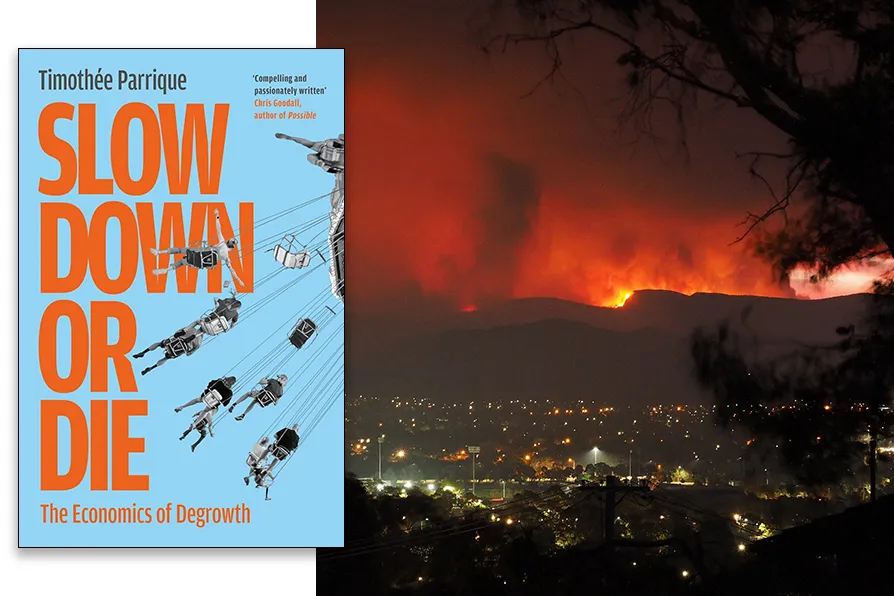New releases from Bill Callahan, The Delines, and Beck
JOHN GREEN applauds an excellent and accessible demonstration that the capitalist economy is the biggest threat to our existence

 APOCALYPTIC: Drought and high temperatures worsened the 2020 bushfires in Australia: the Orroral Valley Fire viewed from Tuggeranong January 28 2020 [PIC: Nick-D/CC]
APOCALYPTIC: Drought and high temperatures worsened the 2020 bushfires in Australia: the Orroral Valley Fire viewed from Tuggeranong January 28 2020 [PIC: Nick-D/CC]
Slow Down or Die – the Economics of Degrowth
Timothee Parrique, Profile Books, £16.99
THIS is a book that shouldn’t have to be written but thank goodness it has. We should already be aware of what Parrique is telling us. Of course some of us are, but our so-called political leaders appear to be totally oblivious of it or cynically dismissive.
Parrique doesn’t mince his words. “The economy has become a weapon of mass destruction,” he writes, paraphrasing Hannah Arendt. There is a “banality of economic evil,” a system that orchestrates the massacre of the living while diluting the culpability of those responsible.
The injustice of our economic system is “planetary apartheid,” he says. “Ecological disintegration is not a crisis but a beating; climate change is a ‘slow violence’,” and although it is largely affecting the most impoverished populations now, it will creep up the social ladder.
He makes clear that this crisis has nothing to do with some supposed human nature but is the symptom of a specific social structure: the primary cause of ecological derailment is not humanity but capitalism — the hegemony of economics over all else and the frantic pursuit of growth.
He points out that in the past growth had a clear function, for example: reviving the US economy after the Great Depression, or the rebuilding Europe after the last world war. Measuring it using GDP helped us monitor progress towards certain goals. That is no longer valid, he argues. Our economies cannot keep on growing ad infinitum and GDP is not a valid measure of economic health. “Maximising growth is,” he writes, “like stepping on the accelerator while being absolutely certain of dying in a social and ecological collapse.”
He proceeds to dismantle the whole concept of GDP as a measure either of progress or economic health, arguing rightly that it ignores essential things that hold society together like unpaid caring, volunteering, and the role of the retired or the very young who are all involved in society but don’t produce any measurable profit. How have we become beholden to single a monetary indicator?
At the moment we are destroying our world by producing useless and unneeded things, like advertising, SUVs, meals delivered by zero-hours workers and it’s all called “wealth creation.” He sheds light on the underlying forces driving our societal choices and compels us to rethink our relationship with the world — with nature, justice, the meaning of life and well-being.
Our survival will depend on our ability to change our economic model. We need to re-examine all aspects of our economic system and reorganise it to ensure we build a post-growth, sustainable one in its stead, he says.
In his concluding chapter, Deserting Capitalism, he suggests various ways of preventing the free-fall into oblivion of our species, none of them easy options, but all feasible.
We can never fully decouple from nature; for better or worse, we are confined in a finite biosphere. Trying to keep the economy in perpetual growth within a limited environment is like someone “wearing child’s shoes into adulthood,” he says.
Parrique writes persuasively, with a passion, clarity and urgency. His book is a basic economic lexicon for non-economists, and should be a core book on the curriculum of every school.

JOHN GREEN asks how can we take decisive action on population levels with a world leader who is a destructive ignoramus

JOHN GREEN wades through a pessimistic prophesy that does not consider the need for radical change in political and social structures

ELIZABETH SHORT recommends a bracing study of energy intensive AI and the race of such technology towards war profits










